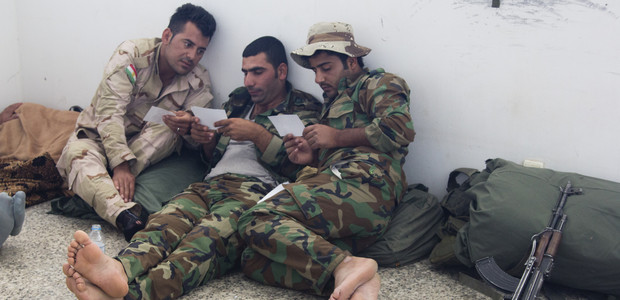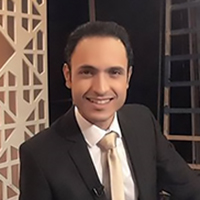Members of the Iraqi Kurdish military are quitting fighting the Islamic State and taking illicit routes to Europe. Why should we pay for our own ammunition and fight for a country that cares so little about us, they ask.
In the middle of August, Ahmed Mohammed, became one of the many Iraqis seeking a safer place to live in Europe. He arrived in Germany less than a month after he left Iraq. But Mohammed is a little different from the other refugees on the road. Because the 34-year-old Iraqi Kurdish man was actually a soldier in the semi-autonomous northern region he comes from, a member of the Iraqi Kurdish military known as the Peshmerga. He had served for eight years before he left.
“When we were fighting the extremists, we were doing so without food or sleep and we had to buy bullets with our own money,” he explains. “It was the craziest time I have ever had. We were defending the nation and we were getting nothing in return.”
On his Facebook timeline, it still says that Mohammed is a member of the Peshmerga – the Iraqi Kurdish military, whose name translates to “those who face death” in English, and who are a source of great pride for those of Kurdish ethnicity in Iraq. But his last post, written as he arrived in Nuremberg, says: “He was sold for a small amount of money. His nation did this to him, not his love”. Another post says that Mohammed wouldn’t want his friends in Iraqi Kurdistan and in the military to follow him along the people smuggling routes to Germany but that he doesn’t regret leaving his homeland. “I want to live like a human being,” the ex-Peshmerga wrote.
Mohammed is not the only member of the Peshmerga to express his concerns. Facebook has plenty of videos by other members of the Iraqi Kurdish military, where they show their empty pockets and talk about stopping the fight against the extremist group known as the Islamic State, who sparked a security crisis in Iraq last June. The Peshmerga are demonstrating how empty their pockets are because of the liquidity crisis currently facing Iraqi Kurdistan, which has its own borders, judiciary and parliament. Ordinary Iraqi Kurdish military men get around IQD700,000 (around US$600) per month, barely enough to feed and house a family in Iraqi Kurdistan.
And nobody knows how many of the Iraqi Kurdish military are leaving the country, along with what might best be described as a tidal wave of youthful Iraqis who are leaving the country because they’ve lost all hope that the government can solve any of the political, financial or military crises that beset their homeland.
There are no detailed figures because often people are leaving the country illegally via people smuggling routes or they are arrested when they reach their destinations, Dashty Jamal, the head of the International Federation of Iraqi Refugees, told NIQASH. Members of the Peshmerga are just as desperate to get out of the country as other Iraqis, Jamal added.
“I came home on July 17, 2015, on the first day of the Eid holiday,” says Aram Kareem, an Iraqi Kurdish policeman who had been assigned duties in an area just outside of Iraqi Kurdistan’s official borders. “But I never left for duty again. I sold my furniture and then I took my wife and three kids and I left the country. I’ve lost hope,” explains Kareem, who is now in a refugee camp in Poland with his family after using people smugglers to get to Europe, via Turkey and Bulgaria. The political crisis around the Iraqi kurdish presidency that seems to have paralysed local government for the time being , alongside the ongoing financial crisis, caused his despondency, Kareem says.
“I just thought, if I die fighting, who would look after my children? Would the President of Iraqi kurdistan look after them?” he says. “I left so that my children don’t have to carry a gun like I did. I left so that they have a chance to become teachers, or doctors – anything but illiterate like me.”
Miran Timari is another young Iraqi Kurdish man who has deserted the Peshmerga to come to Europe; he and some of his friends are currently in Germany. Timari was never a professional soldier. He volunteered to join the local army when the security crisis began and as well as fighting the Islamic State, or IS, group near Kirkuk airport, he and his friends also did charity work to raise funds for the Peshmerga.
“Our family sacrificed a lot to Iraqi Kurdistan,” Timari told NIQASH. “But my father was right when he told me that the Iraqi Kurdish government cares nothing for their rank and file. They care even less about the volunteers. We were buying bullets with our own money but nobody appreciated our efforts. I feel happy here [in Germany]. I feel like I have some rights. If somebody attacks this country, I would defend it because I’ve never felt so happy and secure as I have in these last four moths here.”
The Ministry of Peshmerga in Iraqi Kurdistan doesn’t deny that some of their members are leaving the country, Jabbar Yawar, official spokesman for the Peshmerga, told NIQASH. He also thought that as the financial crisis continued in Iraqi Kurdistan, more Peshmerga would leave Iraq. But, Yawar was quick to add, there are always new volunteers to replace those who leave and that he didn’t believe that morale was adversely affected.
“Military service in the Peshmerga is three years and it is voluntary. Each persons signs a contract to that effect,” Yawar says. “But after the end of the contract, they are free to leave. We asked to form three more brigades recently and we already have 1,005 individuals who have registered their names to join – and that is in just one month.”
When asked about morale and what would happen on the front lines in the fight against the IS group, if everybody did as he had done and left the country, Kareem had this to say: “Let the sons and grandsons of the senior Iraqi Kurdish officials come and fight instead of us. When they visit Kurdistan they just come to take pictures of the Peshmerga. But now they should leave Europe and come to fight with us at the front lines. Why should we fight here while they enjoy a secure life elsewhere? We also love our lives and want to stay safe.”
Source: Niqash, 22.10.2015








Comment here